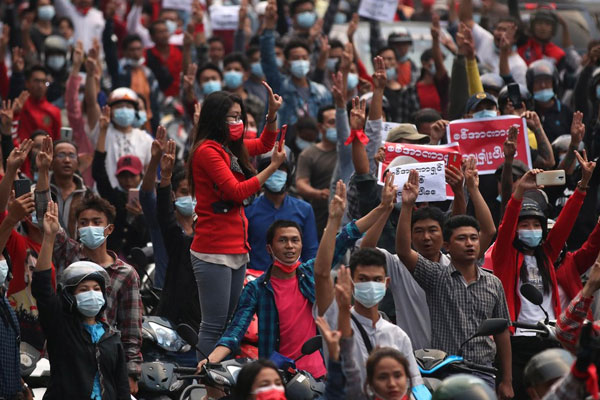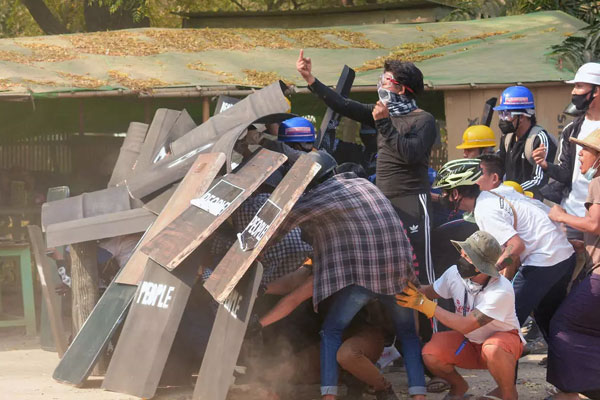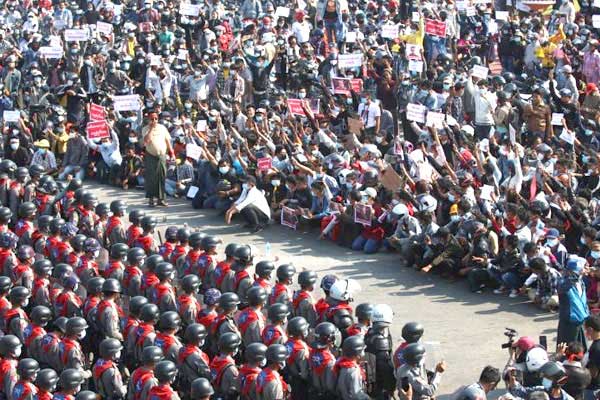After almost two months of protests, general strikes and massive demonstrations, the movement against the military coup in the streets does not stop. The heroic resistance of the Burmese masses is being savagely answered by the coup plotters, the selective repression of the first weeks has led to open repression in order to settle the coup once and for all.
Real fire against the protesters, night house-to-house arrests, deaths under police custody, extension of the Martial Law, closure of all non-regime media, telecommunication cuts…
The Assistance Association for Political Prisoners has reported at least 280 dead and 2,800 people detained so far. However, the coup has not managed to prevail for good, the direct action of the Burmese masses has prevented it and keeps the despotic regimes of Southeast Asia on tenterhooks, those that together with the great imperialist powers are manoeuvring to find a way out of the situation for their own benefit.
The power of the uprising thwarts the plans of the reaction
On February 1, the reaction carried out the coup with openly defined plans: under false accusations of electoral fraud, they decreed state of alarm for one year (expandable to two) and announced the holding of elections right after it. The goal was to regain direct control of the country after the paltry 5.9% of the votes obtained in the last elections by the promilitary party, the Union Solidarity and Development Party (USDP), compared to the National League for Democracy (NLD)’s 83% of Aung San Suu Kyi.
Despite the NLD’s velvet opposition, with which the USPD has coexisted in Parliament in absolute harmony, despite the fact that the Constitution reserves 25% of the seats in Parliament for the military as well as the Ministries of Home Affairs, Defence and Foreign Affairs Archives, despite that its absolute control of the country's wealth is out of parliamentary control, despite everything, the strike rise of an increasingly powerful Burmese working class and the uprisings in neighbouring Thailand and Indonesia ended up convincing the military to take action.
It was all about buying time, using repression to face eventual resistance, stabilising the situation and rebuilding their power under democratic forms in a more favourable context.
But the response of the Burmese masses has exceeded all expectations, blowing up the Military Junta’s calculations. The civil disobedience movement that emerged in the early days in the public sector, especially health workers, quickly morphed into daily strikes and demonstrations. The stepping in of the working class, with the determining weight of the textile sector proletariat, unified the movement along class lines, overcoming the sectarian divisions incited by the ruling class for decades, and also by the NLD, turning it into a massive response that has spread to all corners of the country. To date, the military has not yet been able to restore the functioning of the country's economy, which continues to be affected by work stoppages and strikes.

The Burmese working class in focus of repression
With every step in the repression, the movement has responded with new days of protest. On February 22, two days after the first murdered by real fire, a great general strike called by twenty-five unions of workers, students, peasants and opposition forces paralyzed the country and twelve million people took to the streets.
With fifty dead on the table, on March 8 another day of general strike was the starting signal for the call by union and student organizations for an indefinite strike until the coup leaders were evicted. March 14 has been the bloodiest day so far, with 44 killed by the army, 22 of them concentrated in the Hlaing Thaya industrial district in Yangon, the largest industrial park in the country, where textile workers are concentrated, and whose population of 700,000 inhabitants has played a key role.
Last Wednesday 24th, a "strike of silence", in which people were called to stay at home to prevent more murders, perpetuated the protest by emptying the streets.
The Military Junta focuses its repression on the most combative sectors: massive threats of dismissal to teachers who do not return to work, occupations of hospitals and universities by force, night house-to-house striker raids. The Junta has recovered measures from the previous dictatorship, such as forcing people to register in the district offices the names of the people who spend the night in their homes in order to avoid the overnight stays of trade unionists and other opponents who flee from their homes every night to avoid arrests.
According to local non-regime media, these measures are already causing massive flight, especially from the industrial districts of Yangon, the epicenter of the uprising, in which "absolute" Martial Law has been declared, which implies that anyone who is arrested will be tried in military courts with sentences ranging from three years in prison to capital punishment.
Instability in Southeast Asia and imperialist maneuvers
Since the beginning of the protests, different imperialist powers have been maneuvering in order to benefit from the new scenario. The self-interested calls for "democracy", against the coup and for the reestablishment of the Suu Kyi government carried out by the US and the EU, as well as the economic sanctions applied by them to military interests have not had any effect. Their weight in the Burmese economy, much lower than that of China, restricts them.
For its part, China, the country's main trading partner and which has not condemned the coup, maintains a formal attitude of "non-interference" while using the Military Junta to savagely repress and defend its economic interests.
The Burmese people correctly identify China as a firm ally of the coup plotters, regardless of the good relations it has also cultivated with the NLD to continue doing business, no matter who governs.
On a par with the time when China agreed to "strongly condemn the use of violence against peaceful protesters" in the UN Security Council, the Global Times, the journal of the Chinese Communist Party, stated in an editorial: "those who maliciously defame China and instigate attacks on Chinese factories must be severely punished”. Faced with the burning of several Chinese factories, the responsibility of which protesters have denied, Beijing appealed directly to the Junta to "take measures to protect the safety of their investments and citizens in Myanmar." The response of the military was immediate: sieges to these districts, deaths, arrests and the imposition of absolute Martial Law.
It is undeniable that, at least so far, the repression has failed to stop the protest, which threatens to spread instability to new countries, as is the case in Thailand, and which could lead to an openly revolutionary situation in Myanmar.

Independent media accounts relate the cracks within the repressive forces and the flight of hundreds of police officers and their families to India, after refusing to obey the army's orders to shoot the protesters. The coup’s triumph is not yet a fact; for this reason, an eventual plan B is being prepared to conjure up the revolution, that common enemy that can be beaten by all the imperialists and governments involved.
Only the working class and the oppressed of Myanmar can overthrow the reaction
“Now is the time for de-escalation. It is the time for diplomacy. It is time for dialogue… China's policy of friendship towards Myanmar is for all the people of Myanmar. China is ready to participate and communicate with the relevant parts and play a constructive role in alleviating the current situation” affirmed Chinese ambassador Zhang Jun at the United Nations on March 10.
The ASEAN – Association of Southeast Asian Nations, made up of Indonesia, Malaysia, Singapore, the Philippines, Thailand, Cambodia, Vietnam, Myanmar, Laos and Brunei, and whose alliance represents about 40% of world GDP – has taken a similar stance, offering to “help” find a solution to the crisis, mediating between the Junta, with whose representatives they are in touch, and the protesters.
This organization, through which one of the most important free trade agreements in the world is structured, maintains trade agreements with China, Japan, Australia, New Zealand, India or South Korea, and within it shows the trade war between China and the USA.
The White House National Security Advisor, Jake Sullivan, has already addressed ASEAN ambassadors urging them to support the “immediate restoration” of democracy in Myanmar in an open confession of the United States’ weakness in the area and its search for alliances with other regional powers.
For its part, the NLD, which all this time and despite the arrests of its leaders and the assassinations of its officials, has only made abstract calls to resist repression and defend legality, and has set up the “Committee Representing the Pyidaungsu Hluttaw (National Parliament)” (CRPH), with non-detained deputies whose aspiration is to be recognized by the UN and the international community as the legitimate representative of the interim government.
The same people who publicly defended the massacre of the Rohingya people have made an appeal to incorporate other groups to their cause and form a “federal democracy” that integrates the interests of all ethnic groups and guerrillas, an initiative that has been well received by the ASEAN, which acts as their consultants.
The plot behind the backs of the masses to open the way to a national unity agreement, including even the military, to stop the protests if the coup fails, seems to be underway.
Along this path, the "democratic" opposition of the NLD has always been a firm ally in maintaining the status quo and neither offers nor represents any alternative for the Burmese masses. Beyond the diplomatic maneuvers and abstract appeals of the NLD, the only thing that keeps the final triumph of the coup in doubt is the direct action of the masses.
That revolutionary energy is the only one that, armed with the program of the socialist revolution, can end the oppression of centuries and open the door to the socialist transformation in Southeast Asia.





















































